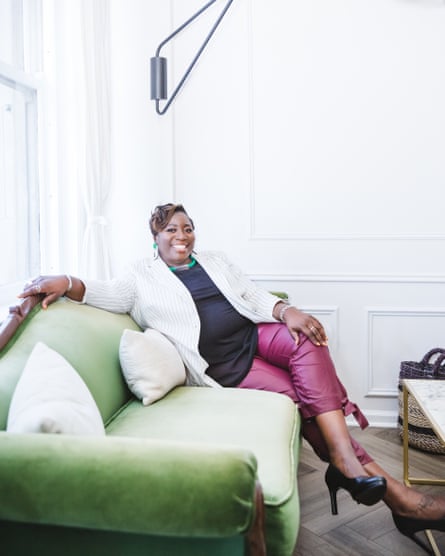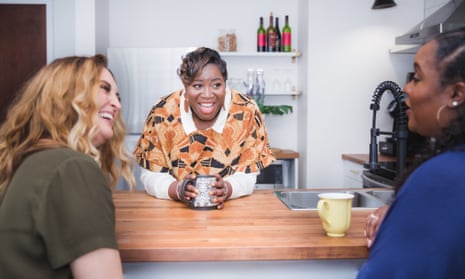Latasha Morrison was attending a predominantly white evangelical church in Atlanta in 2012 when protests erupted over the murder of Trayvon Martin.
The Black teen’s killing by a neighbourhood watch volunteer rattled Atlanta’s Black communities. But when Morrison tried to pray about Martin at a small group meeting, she received no words of comfort or solidarity from her fellow churchgoers. It was as if they were living in “another world”, Morrison told the Guardian.
“You have something like this, that’s impacting you, that’s making you afraid for your children, for your friends’ children, for your relatives, and it’s not even a thought to people who say they care, that we’re connected, that we’re the body of Christ?” Morrison said.
“You’re not mourning when I mourn, you’re not weeping when I weep?”
It was a turning point in Morrison’s life. More than 60 years ago, Martin Luther King described 11 o’clock on Sunday morning as “one of the most segregated hours… in Christian America”.
Morrison saw for herself how segregated America’s churches still are – and felt compelled to do something about it.
“[Heaven] is not going to be segregated. So why are we living segregated lives?” she asked.
Morrison founded Be the Bridge (BTB), a non-denominational Christian organization that promotes dialogue about racial justice, in 2016. Through small groups, workshops and curricula, BTB seeks to foster interracial conversations and friendships, particularly between white evangelicals and Christians of color.
The network has expanded significantly since the police killing of George Floyd, whose death last year led to a renewed global reckoning with racial injustices. BTB’s Facebook group grew from 30,000 members last spring to nearly 75,000 people today, Morrison said, and her book, Be the Bridge: Pursuing God’s Heart for Racial Reconciliation, became a New York Times bestseller.
The non-profit now has more than 2,000 BTB small groups, predominantly based in the US.

“Be The Bridge gave people a place to go,” Morrison, 48, said. “People were able to tap into what we were already doing and say, ‘Hey, I recognise this for the first time, I can be part of this, I can learn and I can engage.’”
Despite this rapid growth, white supremacy’s lingering influence on American Christianity makes BTB’s vision of racial reconciliation a daunting task.
Today, about 7% of Americans are Black Protestants, according to the Public Religion Research Institute’s 2020 census of American religion. About 44% of Americans identify as white Christians, with 14% saying they are white evangelical Protestants.
Because of the discrimination Black Christians have historically faced in white churches, they sought refuge by building their own spiritual communities. This history means that Black and white Christians might hail from the same religious traditions – such as the Baptist or Pentecostal movements – but belong to different denominations.
Studies have demonstrated that most white Americans, both Christian and non-Christian, have few or no close Black friends, according to Valerie Cooper, an associate professor of religion and Black church studies at Duke Divinity School who is writing a book about Christian racial reconciliation efforts.
Most American churches are more segregated than the neighborhoods where they are located, Cooper said. It’s extremely difficult to desegregate an existing church without driving members away, she added.
“These days, there’s a great deal of heat about issues of race, but very little light. Because of the level of conflict being generated around issues of race, fewer people have any desire to have deep conversations around them,” Cooper said.
“And yet, calm, thoughtful and honest conversations appear to me to be what is desperately needed here.”
At a virtual meeting last month, about 20 members of a multiracial BTB group based in southern New Jersey – largely made up of women – gathered on Zoom to work through a chapter of the non-profit’s Bridge to Racial Unity discussion guide. The topic for the night was confession.
According to BTB, confession in the context of racial reconciliation requires both white Christians and Christians of color to evaluate whether they have privately held racist or colorist beliefs, and to acknowledge how their lives have been shaped by systemic racism.
Confession is one of many steps in the journey, BTB believes. True reconciliation also requires repentance, which means walking away from the sins of the past; reparations, or making concrete amends; and restoration, or repairing broken relationships.
During that night’s discussion, a local incident appeared to be top of mind – a viral video of a white man hurling racial slurs at his Black neighbors. In response to the video and other reports of the man harassing his Black neighbors in the past, more than 100 protesters gathered outside the man’s home last month. The majority were peaceful, but a few threw objects at the suspect as he was taken into police custody.
Beyond the legal process, members of the BTB group wrestled with what they could do to ensure healing for the man and the community. One woman of color said that, while she completely understood the protesters’ frustration, she worried they were “burning a bridge with their anger” and precluding the opportunity for a relationship.
“What would it look like to sit down with this man and have a coffee with him?” she asked. “I have no idea.”
It’s hard to try to build a relationship with someone this volatile, another member, also a woman of color, argued. People need advanced skills to have these tough conversations, she said, adding that this is what many in the group were seeking when they joined Be the Bridge.
Another woman of color said she was feeling pessimistic about whether race relations would ever change for the better in her town. Confession needs to be paired with turning away from old patterns, she said. But there was still so much “unacknowledged hurt” that she was having a hard time staying engaged in conversations about reconciliation, she said.
“I’m trying my best to stay within it, but it just hurts so much,” she said. “You can’t have forgiveness without acknowledgment.
“I don’t want to be a damper, but I get so angry,” she added.
Other members of the group were quick to validate her feelings and express their solidarity.
“Your feelings are valid and we want to hear your heart,” one participant, a white woman, typed into the chat.
“You are not a damper,” another white participant typed. “We love you.”
A core part of BTB’s philosophy is encouraging participants to listen before chiming in. BTB asks white Christians to pay attention to the stories of people of color and learn about the history of race relations in America. The non-profit has a separate discussion guide for Black and Indigenous people that focuses on collective healing and self-care, as well as discovering and dismantling internalized racism and colorism.
Amy Hill, a white evangelical who serves as a leader for the south Jersey group, told the Guardian that before she got involved in BTB, she believed racism was a personal sin that would show up in obvious ways, such as through membership in the Ku Klux Klan. Issues like the police shootings of Black men or mass incarceration weren’t often on her radar, she said.
As someone who grew up in white evangelical spaces, Hill interacted with Christians of color mainly in the context of missionary work. Looking back, Hill, 42, said she thinks she was trying to sincerely and faithfully serve marginalized communities, but “without a full understanding of history or of my own oblivious participation in ongoing systems that perpetuate racism and injustice”.
“I could see the devastation plaguing certain populations of people in our nation. I could see the effects of injustice. But I was oblivious as to the why, the root causes of a lot of these things. I didn’t know how we got here, or what was keeping us here,” Hill said.
“Before BTB, it was like I was trying to bandage wounds, but without giving thought to the ways I might prevent future wounds from occurring in the first place.”
Hill’s experience is not uncommon among white evangelicals, who often view racism not as systemic, but as a personal sin that occurs when one individual acts in racist ways toward someone else. In the aftermath of Floyd’s murder, some white evangelicals participated in protests and called for reparations. But on the whole, the religious group’s attitudes about racial justice remained unchanged.
In a Public Religion Research Institute survey published last August, about 72% of white evangelicals (more than any other religious group) said police killings of Black men were isolated incidents, rather than part of a broader pattern of how police treat Black Americans. Only 31% of Protestant people of color said the same. Most white evangelicals didn’t think generations of slavery and discrimination had created conditions that make social mobility more difficult for Black Americans(72%). Fewer Protestant people of color (44%) said the same.
More recently, white evangelical leaders have decried critical race theory, an academic discipline that examines the ways in which racism operates in US laws and society. White evangelicals’priorities are often reflected in the Republican party’s agenda. Republican lawmakers in more than 20 states have recently introduced or passed legislation banning critical race theory from public schools.
Calls for white evangelicals to learn from people of color are often met with collective resistance, according to Christina Edmondson, an anti-racism educator and a co-host of the Truth’s Table podcast.
“Because of the history of white supremacy and Christianity in the western world, white Christians as a collective are often socialized to believe that they are the teachers, even on topics that they are utterly uninformed about and emotionally resistant to exploring,” Edmondson said.
“However, there are individuals who are open to learning and growing, which risks their in-group status, sense of community, and can spur identity crises as they experience the dismantling of American mythology.”
In order to join Be the Bridge, white people need to acknowledge that racism is embedded in both individuals and structures, Morrison said. This requirement ensures that people of color who participate feel protected.
“We’re not trying to convince anyone that systemic racism exists,” she said. “That’s not our audience, that’s another group of people, because I think that takes heart transformation.”
Morrison believes the battle she is fighting is part of a spiritual, supernatural struggle between good and evil, and she says she fully expects pushback from fellow Christians.
“I understand history enough to know that some people will get it and some people won’t,” she said. “But God’s kingdom never expanded through the majority – it always expanded through a small group of people, a remnant.”
Asked where she sees BTB making the biggest impact in the future, Morrison recalled a party that one of her friends threw for a child’s graduation. For years, that friend had been close only to other Black people. The relationships the friend made through BTB dramatically opened up her circle, so much so that when Morrison walked into the graduation party, she was surrounded by a racially diverse group of close-knit friends.
“That is what gives me hope,” she said. “Because people are changing, people are transforming and they are changing the places where they intersect.”
